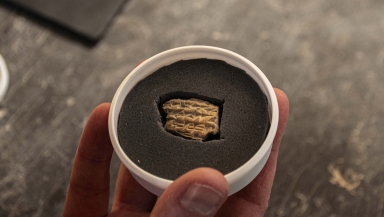
Archaeologists in Israel have discovered an incredibly rare ancient cuneiform inscription with a link to Hezekiah, King of Judah, who is mentioned in the Bible.
The find concerns a delay to a tribute payment from the Kingdom of Judah to the Assyrian Empire.
In the Old Testament accounts, Hezekiah rebelled against the Assyrian King Sennacherib. Sennacherib’s army laid siege to Jerusalem, but after sincere prayer from Hezekiah and his ministers, the angel of the Lord destroyed Sennacherib’s army, forcing him to abandon the siege.
The inscription, which may be related to the event, was found on an inch-long pottery shard that is believed to date back 2,700 years.
Although it does not mention the King of Judah by name, researchers said that the chronological context in which the fragment was found and the details in the partial inscription make the connection likely.
The sherd was found during a dig near the Western Wall of the Temple Mount and was written in the language of the Akkadians. It is believed to be the only Assyrian inscription from the First Temple era to be found in Jerusalem.
The sherd appears to be part of an inscribed royal sealing sent by Assyria and mentions the due date of a tax or tribute, leading to speculation that Judah had failed or refused to pay Assyria its dues as overlord.
Researchers working at the site said that it may "attest to a certain point of friction between Judah and the imperial government", and possibly the revolt recorded in 2 Kings 18:7.
The sherd was found by Moriah Cohen, who works at the Archaeological Experience in Emek Tzurim.
“I was sifting through the dirt and suddenly noticed a sherd with a strange decoration. Examining it closely, it looked to me to be cuneiform, but that seemed totally unreasonable. Even though so many fascinating finds have been discovered here over the years, we've never, ever found anything like this," she said.
“I examined it yet again. After decidedly determining that this was no decoration, but really was cuneiform, I screamed out of excitement."
She added, "For me personally, the thought that after 2,700 years, I am the first person to actually touch this pottery with my hands is a very exciting thought. This is a once-in-a-lifetime find.”
The dig is being directed by Dr Ayala Zilberstein of the Israel Antiquities Authority, who said the artefact provided clear evidence of official correspondence between the Assyrian Empire and the Kingdom of Judah.
It deepens current understanding of the time period in question, he added.
"The inscription provides direct evidence of official correspondence between the Assyrian Empire and the Kingdom of Judah," he said.
"The discovery strengthens our understanding of the depth of the Assyrian presence in Jerusalem, and the extent of its influence on and involvement in the conduct of the affairs of the Judean kingdom.
"In addition, it expands knowledge about the status of the new neighborhood that developed at that time on the slopes of the hill to the west of the Temple. It appears that this area served as a focus for the activities of high-ranking ministers and persons.”













